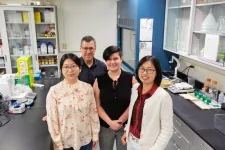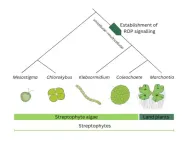(Press-News.org) Four in five primary caregivers of nine-month-old babies reported cuddling, talking and playing with their little one several times a day, in England's first national long-term study of babies in over two decades, led by UCL (University College London).
More than half engaged in physical or turn-taking play, singing, pretend games and noisy play with their babies several times a day – activities which were linked to improved early language development. Around three quarters showed their babies picture books or took them outside at least once a day.
For just over one in 14 (7.4%) of these babies, most of those daily interactions will be with their father, who is their primary caregiver. Just 20 years ago, only one in 1,000 (0.11%) of nine-month-olds were cared for primarily by their dad at this age.
The first report from the Children of the 2020s study, published today by the UK Department for Education (DfE) and led by UCL in partnership with Ipsos and the universities of Cambridge and Oxford, and Birkbeck, University of London, revealed that these home activities are having positive effects on babies’ understanding of common words, like ‘ball’, ‘bye-bye’ and ‘mummy’, as babies that played more with caregivers understood more words at this age.
Overall, nine-month-olds understood an average of 14 out of 51 common words. This was similar to pre-pandemic norms, despite added pressure on today’s families.
The findings also showed that parents are navigating significant challenges in their babies’ first months, with a quarter facing at least some financial strain and around a fifth reporting seeking help from a doctor for feelings of depression since the birth of their child.
Commissioned by the DfE, Children of the 2020s is following more than 8,500 families and their babies, born in England between September and November 2021. It is the first long-term, nationally representative study of babies since the UK Millennium Cohort Study was launched more than 20 years ago. Children of the 2020s will follow families for at least the first five years of their children’s lives, shedding new light on the factors that can influence early years development. The first survey took place when the babies were, on average, nine and a half months old.
The first findings from the study paint a picture of a new generation of infants and their families.
Today’s parents
32% of today’s primary caregivers were on parental leave from their job when their child was nine months old, compared to just 2.5% of primary caregivers 20 years ago.
Compared to parents raising children two decades ago, today’s caregivers are more likely to be educated to degree level or higher (50% v 33%), and employed (71% v 51%).
Family finances
25% of families with nine-month-olds had experienced significant financial strain, such as having difficulties managing finances, not keeping up with bills, being unable to afford essential baby items, and having to skip or cut the size of meals.
Today’s parents are less likely to own their home (50% v 64%) and more likely to rent (42% v 31%) than parents two decades ago.
47% of today’s parents own their home with the help of a loan or mortgage, and 3% of families own their home outright. Among those renting when their babies were nine months, 24% rented from a private landlord, 10% from a local authority, and 8% from a housing association.
Childcare
43% of families were using some form of regular childcare when their babies were nine months. Of these families, most were using informal childcare provided by relatives or friends. However, one in eight were using formal childcare such as day nurseries or childminders.
Parents on the highest incomes were almost six times as likely to use formal childcare (23% v 4%) than those from the most disadvantaged homes.
They were also more likely to use informal childcare (40% v 31%), mainly from grandparents and other relatives and friends.
Screen use
72% of parents said their nine-month-olds spent some time watching television, videos or screens every day. On average, children who watched screens typically did so for an average of 41 minutes a day, however 7% of babies had more than two hours of screen time per day and 28% had none at all.
Children of the 2020s is one of the first and largest studies to measure screen time in infancy.
Play and language development
At nine months, those who often played turn-taking games, like peek-a-boo, with their caregivers understood five more words, on average, than babies who did these things least. Similarly, those who were read to several times a day understood four more words, and babies who engaged in frequent physical play understood three more words, on average.
While the researchers caution they do not yet know whether these babies that understand more words at nine months will continue to progress more quickly, the findings are in line with other evidence that play in infancy and early childhood can improve long term language and cognitive development.
Access to healthcare services
24% of parents reported they had had trouble getting an appointment with a GP in the past 12 months, and 19% had had problems accessing a health visitor.
More than a quarter of mothers (26%) had used breastfeeding support services since their baby was born, with 13% paying for breastfeeding support.
Covid-19
14% of mothers had had a confirmed or suspected Covid-19 infection during their pregnancy. Between birth and age nine months, two in five babies (41%) and more than half of their parents/carers (57%) had been infected with Covid-19.
74% of primary caregivers had at least one dose of a Covid-19 vaccine, and 37% of mothers had had a dose during pregnancy.
Study director, Professor Pasco Fearon (UCL Psychology & Language Sciences and the Centre for Family Research at the University of Cambridge), said: “We are extremely excited to unveil these first findings from the landmark Children of the 2020s study, the first new national study of babies to be launched since the millennium. These vital new insights reveal the dramatic shifts in our society over that time, with fathers taking a greater role in parenting and parents more likely to be balancing caring responsibilities with work and parental leave.
“As the first post-Covid study of families with babies, Children of the 2020s shows the many challenges parents are now facing as they deal with rising costs, health and mental health difficulties, and issues accessing public services. There are, however, very encouraging signs of resilience, with parents showing how engaged they are with creating a healthy home learning environment for their children, spending a substantial amount of time interacting positively with their babies and helping to develop their early language skills.”
A Department for Education spokesperson said: "The department commissioned this research to better understand early childhood development factors which will help shape policy decisions. We are encouraged by many parents engaging in activities like reading and play, recognising its importance in early development.
“Understanding the pressures many households are under, we've expanded free school meal eligibility several times since 2010, to more groups of children than any other Government over the past century. This is in addition to offering record financial support averaging £3,300 per household, implementing our transformational childcare reforms, increasing the National Living Wage, and providing help for households with food, energy and other essential costs."
Children of the 2020s is the latest in the UK’s rich portfolio of national cohort studies, joining long-running studies of people born in 1946, 1958, 1970, 1989-90 and 2000-02, all of which are based at UCL.
Findings from wave 1 of the Children of the 2020s (Cot20s) longitudinal study, published by the Department for Education
Children of the 2020s study website
UCL Centre for Longitudinal Studies
IOE, UCL’s Faculty of Education and Society END
Despite pressures facing young families, parents take precious moments to play with their babies
2023-11-30
ELSE PRESS RELEASES FROM THIS DATE:
Combined use of alcohol and THC can affect rat brains, study finds
2023-11-30
The increased legalization of cannabis over the past several years can potentially increase its co-use with alcohol. Concerningly, very few studies have looked at the effects of these two drugs when used in combination. In a series of new studies, researchers at the University of Illinois Urbana-Champaign used rats to understand how brain structure and behavior can change when cannabis and alcohol are taken together.
Most researchers have studied the effects of either alcohol or THC (delta-9-tetrahydrocannabinol), the primary psychoactive drug in cannabis, alone. However, when people, especially adolescents, use these drugs, ...
Tis the season to recognize chocolate: researchers highlight high quality cacao in Colombia
2023-11-30
Scientists are working to protect the unique qualities of cacao beans grown in the Buenaventura region on the Pacific coast of Colombia.
In a study published in the Journal of the Science of Food and Agriculture, researchers from the Colombian Corporation for Agricultural Research (AGROSAVIA) have examined a wealth of metrics to uncover the complex interactions between environmental factors and cacao quality.
In a pioneering move, they have proposed that Buenaventura should be designated as a new Denomination of Origin (DO) for cacao trees. This is a legal recognition given to products that originate ...
Straining memory leads to new computing possibilities
2023-11-30
By strategically straining materials that are as thin as a single layer of atoms, University of Rochester scientists have developed a new form of computing memory that is at once fast, dense, and low-power. The researchers outline their new hybrid resistive switches in a study published in Nature Electronics.
Developed in the lab of Stephen M. Wu, an assistant professor of electrical and computer engineering and of physics, the approach marries the best qualities of two existing forms of resistive switches used for memory: memristors and phase-change materials. Both forms have been explored for their advantages over ...
Antarctica's ancient ice sheets foreshadow dynamic changes in Earth’s future
2023-11-30
MADISON – Nineteen million years ago, during a time known as the early Miocene, massive ice sheets in Antarctica rapidly and repeatedly grew and receded. The Miocene is widely considered a potential analog for Earth's climate in the coming century, should humanity remain on its current carbon emissions trajectory.
Identifying how and why Antarctica's major ice sheets behaved the way they did in the early Miocene could help inform understanding of the sheets' behavior under a warming climate. Together, the ice sheets lock a volume of water equivalent to more than 50 meters of sea level rise and influence ocean currents that affect marine food webs and regional climates. ...
Modular chimeric cytokine receptors improve CAR T–cell therapy for solid tumors
2023-11-30
(MEMPHIS, Tenn. – November 30, 2023) Immunotherapy using modified chimeric antigen receptor (CAR) T cells has greatly improved survival rates for pediatric patients with relapsed and recurrent leukemia. However, these therapies are not as effective in treating solid tumors and can have significant toxicity. Findings from St. Jude Children’s Research Hospital showed that adding a modular chimeric cytokine receptor to CAR T cells increased their efficacy in multiple solid tumor models. The study was published today in Nature Biomedical Engineering.
“We designed modular chimeric cytokine receptors and showed that ...
Climate: why disinformation is so persistent
2023-11-30
Melting of glaciers, rising sea levels, extreme heat waves: the consequences of climate change are more visible than ever, and the scientific community has confirmed that humans are responsible. Yet studies show that a third of the population still doubts or disputes these facts. The cause is disinformation spread by certain vested interests. To try and prevent this phenomenon, a team from the University of Geneva (UNIGE) has developed and tested six psychological interventions on nearly 7,000 participants from twelve countries. The research, published in ...
Early body contact develops premature babies' social skills
2023-11-30
Skin-to-skin contact between parent and infant during the first hours after a very premature birth helps develop the child's social skills. This is according to a new study published in JAMA Network Open by researchers from Karolinska Institutet and others. The study also shows that fathers may play a more important role than previous research has shown.
In current practice, very premature babies are usually placed in an incubator to keep them warm and to stabilize them during the first hours after birth. In the “Immediate parent-infant skin-to-skin study” (IPISTOSS), 91 premature babies born at 28 to 33 weeks were randomized to either ...
ROP signaling: Origin at dawn of multicellular plant life
2023-11-30
Plants regulate their development with a distinct group of molecular players. ROP proteins, a group of plant-specific proteins, are known to control plant tissue formation. Now, Hugh Mulvey and Liam Dolan at the GMI show that ROP proteins evolved at the transition between unicellular and multicellular plant life. The findings are published on November 30 in the journal Current Biology.
Being non-mobile, plants follow a very different lifestyle from us animals. To grow and develop, plants also need a distinct ...
Twin research indicates that that a vegan diet improves cardiovascular health
2023-11-30
In a study with 22 pairs of identical twins, Stanford Medicine researchers and their colleagues have found that a vegan diet improves cardiovascular health in as little as eight weeks.
Although it’s well-known that eating less meat improves cardiovascular health, diet studies are often hampered by factors such as genetic differences, upbringing and lifestyle choices. By studying identical twins, however, the researchers were able to control for genetics and limit the other factors, as the twins grew up in the same households ...
A mineral produced by plate tectonics has a global cooling effect, study finds
2023-11-30
MIT geologists have found that a clay mineral on the seafloor, called smectite, has a surprisingly powerful ability to sequester carbon over millions of years.
Under a microscope, a single grain of the clay resembles the folds of an accordion. These folds are known to be effective traps for organic carbon.
Now, the MIT team has shown that the carbon-trapping clays are a product of plate tectonics: When oceanic crust crushes against a continental plate, it can bring rocks to the surface that, over ...




